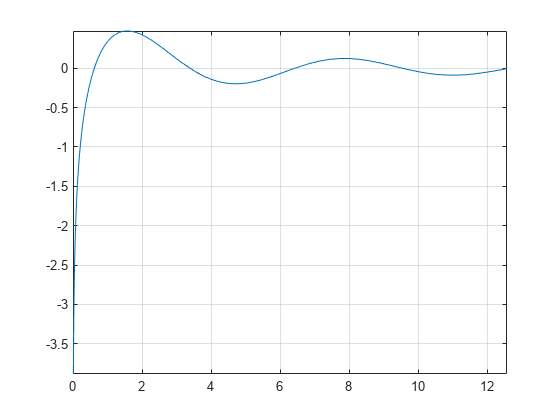cosint
Cosine integral function
Syntax
Description
cosint( returns the cosine integral function of
X)X.
Examples
Cosine Integral Function for Numeric and Symbolic Arguments
Depending on its arguments, cosint returns
floating-point or exact symbolic results.
Compute the cosine integral function for these numbers. Because these numbers are not
symbolic objects, cosint returns floating-point results.
A = cosint([- 1, 0, pi/2, pi, 1])
A = 0.3374 + 3.1416i -Inf + 0.0000i 0.4720 + 0.0000i... 0.0737 + 0.0000i 0.3374 + 0.0000i
Compute the cosine integral function for the numbers converted to symbolic objects.
For many symbolic (exact) numbers, cosint returns unresolved
symbolic calls.
symA = cosint(sym([- 1, 0, pi/2, pi, 1]))
symA = [ cosint(1) + pi*1i, -Inf, cosint(pi/2), cosint(pi), cosint(1)]
Use vpa to approximate symbolic results with floating-point
numbers:
vpa(symA)
ans = [ 0.33740392290096813466264620388915... + 3.1415926535897932384626433832795i,... -Inf,... 0.47200065143956865077760610761413,... 0.07366791204642548599010096523015,... 0.33740392290096813466264620388915]
Plot Cosine Integral Function
Plot the cosine integral function on the interval from 0 to 4*pi.
syms x fplot(cosint(x),[0 4*pi]) grid on

Handle Expressions Containing Cosine Integral Function
Many functions, such as diff and
int, can handle expressions containing
cosint.
Find the first and second derivatives of the cosine integral function:
syms x diff(cosint(x), x) diff(cosint(x), x, x)
ans = cos(x)/x ans = - cos(x)/x^2 - sin(x)/x
Find the indefinite integral of the cosine integral function:
int(cosint(x), x)
ans = x*cosint(x) - sin(x)
Input Arguments
More About
References
[1] Gautschi, W. and W. F. Cahill. “Exponential Integral and Related Functions.” Handbook of Mathematical Functions with Formulas, Graphs, and Mathematical Tables. (M. Abramowitz and I. A. Stegun, eds.). New York: Dover, 1972.
Version History
Introduced before R2006a